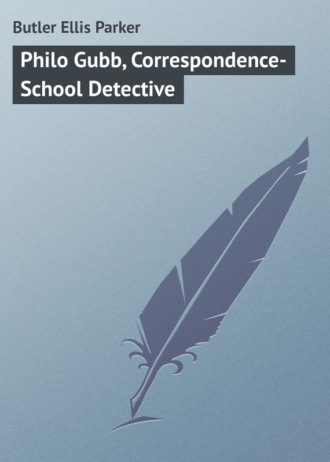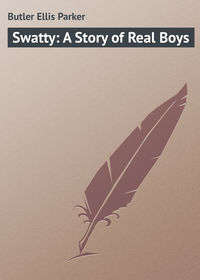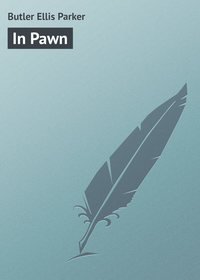 полная версия
полная версияPhilo Gubb, Correspondence-School Detective
“I can tell you if I want to,” said Mr. Enderbury. “What do you want to know for?”
“If those claws are the work of Mr. Herr Schreckenheim,” said Mr. Gubb, “I am prepared to offer to Miss Syrilla her daughterly place in a home of wealth at Riverbank, Iowa. If those claws are Schreckenheim claws, Miss Syrilla is the daughter of Mr. Jonas Medderbrook of the said burg, beyond the question of a particle of doubt.”
Mr. Enderbury looked at Mr. Gubb with surprise.
“That’s non – ” he began. “And if Schreckenheim did those claws, you’ll take Syrilla away from this show? Forever?” he asked.
“I will,” said Philo Gubb, “if she desires to wish to go.”
“Then I have nothing whatever to say,” said Mr. Enderbury, and he shut his mouth firmly; nor would he say more.
“Do you desire to wish me to understand that they are not the work of Mr. Herr Schreckenheim?” persisted Mr. Gubb.
“I have nothing to say!” said Mr. Enderbury.
“I consider that conclusive circumstantial evidence that they are,” said Detective Gubb, and he clanked out of the side-show.
Syrilla was still seated at the grub table, finishing her meal, and Mr. Gubb seated himself opposite her. As delicately as he could, he told of Jonas Medderbrook and his lost daughter, of the home of wealth that awaited that daughter, and finally, of his belief that Syrilla was that daughter. It was clear that Syrilla was quite willing to take up a life of refinement and dieting if she was given an opportunity such as Mr. Gubb was able to offer in the name of Jonas Medderbrook; and, this being so, he questioned her regarding the eagle’s claws.
“Mr. Gubb,” she said, “I wish to die on the spot if I know how I got them claws tattooed onto me. If you ask me, I’ll say it is the mystery of my life. They’ve been on me since I was a little girl no bigger than – why, who is that?”
Mr. Gubb turned his head quickly, but he was not in time to see a plump, good-natured looking little German-American slip quickly out of sight behind the cook tent. Neither did he see the glitter of the sun on a large silver golf cup the plump German-American carried under his arm; but the German-American had recognized Mr. Gubb, even through his disguise of a cowboy.
“No matter,” said Syrilla. “But these claws have been on my arm since I was a wee little girl, Mr. Gubb. I always thought they was a trademark of a hospital.”
“I was not knowingly aware that hospitals had trademarks,” said Mr. Gubb.
“Maybe they don’t,” said Syrilla. “But when I was a small child I had an accident and had to be took to a hospital, and it wasn’t until after that that anybody saw the eagle’s claws on me. I considered that maybe it was like the mark the laundry puts on a handkerchief it has laundered.”
“I don’t know much about the manners of the ways of hospitals,” admitted Mr. Gubb, “and that may be so, but I have another idea. Did you ever hear of Mr. Herr Schreckenheim?”
“Only that Mr. Enderbury is always cross on the days of the month that he gets Mr. Schreckenheim’s statements of money due. Mr. Schreckenheim is the man that tattooed Mr. Enderbury so beautiful, but poor Mr. Enderbury has never been able to pay him in full.”
Philo Gubb arose.
“I am going to telegraph Mr. Medderbrook to come on to West Higgins immediately by the three p. m. afternoon train,” he said, “and you will meet him as your paternal father and arrange to make your home with him as soon as you desire to wish it.”
At five o’clock that afternoon, Mr. Medderbrook, escorted by Mr. Gubb, entered the side-show tent. The lady and gentlemen freaks were resting before evening grub, and all were gathered around Syrilla’s platform, for the news that she was to leave the show to enter a home of wealth and refinement had spread quickly. Syrilla herself was in tears. Now that the time had come she was loath to part from her kind companions.
“I tell you, Mr. Gubb,” Mr. Medderbrook said, as they entered the side-show, “if you have indeed found my daughter you have made me a happy man. You cannot know how lonesome my life has been. Now, which is she?”
“She is the female lady in the pink satin dress on that platform,” said Mr. Gubb.
Mr. Medderbrook looked toward Syrilla and gasped.
“Why, that – that’s the Fat Woman! That’s the Fat Woman of the side-show!” he exclaimed. “I thought – I – why, my daughter wouldn’t be a Fat Woman in a side-show!”
“But she is,” said Mr. Gubb.
“Great Scott!” exclaimed Mr. Medderbrook.
For years Mr. Medderbrook had retained a memory of his daughter as he had seen her last, a tender babe in long clothes. As he rode toward West Higgins, however, he had thought about his daughter and he had revised his conception of her. She was older now, of course, and he had finally settled the matter by deciding that she would be a dainty slip of a girl – probably a tight-rope walker or one of the toe-dancers in the Grand Spectacle, or perhaps even engaged as the Ten-Thousand-Dollar Beauty. But a Fat Lady! Mr. Medderbrook walked toward Syrilla. Every eye in the tent was upon him. There was utter silence except for Syrilla’s happy sobbing.
“Shess!” said a voice suddenly. “You bet I vos here! Und I vant my money! Years I haf been collecding dot bill, und still you owe me. Now I come, and you pay me all vot you owe or I make troubles!”
The voice came from outside the tent, and with surprising agility Detective Gubb dived under the platform and wriggled under the canvas wall.
“I don’t owe you a cent!” exclaimed the voice of Mr. Enderbury. “I’ve paid you for every bit of tattoo I have on me.”
“Seven hunderdt dollars vos der contract,” cried the voice of Herr Schreckenheim. “Und ten dollars is due me yet. I vant it.”
“Well, you’ll keep on wanting it,” said Mr. Enderbury’s voice. “Look here! Look at my chest. There’s the eagle you did on me – do you see any claws on it? No, you don’t! Well, I’m not going to pay for claws that are not on me. No, sir!”
“Claws? I do some claws on you, don’t I, ven I do dot eagle?” asked the German-American.
“Yes, but they’re not on me now, are they?” asked Mr. Enderbury, “You can go and collect from the person that has them. What do I care for her now? She’s going to quit the circus business. I’ve paid for all the tattoo that’s on me; you go and collect ten dollars for those claws from Syrilla.”
“Und how does she get those claws on her?” asked Herr Schreckenheim shrewdly.
“I’ll tell you how,” said Mr. Enderbury. “You remember when Griggs’ & Barton’s Circus burned down years ago? Well, Syrilla was burned in that fire – burned on the arm – and they took her to a hospital and her arm wouldn’t heal. So somebody had to furnish some skin for a skin-grafting job, and I did it. The piece they took had those claws on it. That’s what happened. I gave those eagle’s claws to cure her, and I’ve hung around her all these years like a faithful dog, and she don’t care a hang for me, and now she’s going away. Go and collect for those claws from her. I haven’t got them. She’s going to be rich; she can pay you!”
Simultaneously there was an exclamation from Mr. Medderbrook, a cry from Syrilla, and a short, sharp yell from outside the tent. Mr. Gubb entered, spurs first, creeping backward under the canvas. As he backed from under the platform it was observed that he held a shoe – about No. 8 size – in one hand, and that a foot was in the shoe, and the foot on a leg, and the leg on a short, plump, elderly German-American, who yelled as he was dragged into the tent on his back. In one hand of the German-American was a large silver golf cup with a deep dent on one side. As Mr. Gubb arose to his feet, still holding the German-American tattoo artist’s foot in his hand, he said: —
“Mr. Medderbrook, the deteckative business is not always completely satisfactory in all kinds of respects, and it looks as if it appeared that the daughter I found for you is somebody else’s, but if you will look at the other end of the assaulter and batterer I have in hand, you will see that I have recovered the silver golf cup trophy once again for the second time.”
“And that,” said Mr. Medderbrook as he took the cup from the German-American’s hand, “is remarkable work. The ordinary detective is usually satisfied to recover stolen property once, but you have recovered this cup twice.”
“The motto of my deteckative business,” said Mr. Gubb modestly, “is ‘Perfection, no matter how many times.’”
Mr. Gubb might have said more, but he was interrupted by Princess Zozo, the Snake Charmer, who had walked around Syrilla and unhooked two of the hooks at the top of Syrilla’s low-necked gown.
“Look!” she exclaimed, and she pointed to a second pair of eagle’s claws tattooed between Syrilla’s shoulder blades. Without a word Mr. Medderbrook took five hundred dollars from his purse and handed them to Mr. Schreckenheim.
“That pays you for the cup,” he said. And then, turning to Syrilla: “Come to my arms, my long-lost daughter!”
After Syrilla had hugged her father affectionately, Mr. Gubb and the freaks laid him on the ground and, by fanning him vigorously, were able to bring him back to life. Mr. Medderbrook’s first act upon opening his eyes was to hold out his hand to Mr. Gubb.
“Thank you, Gubb,” he panted. “It’s a big price, but I’ll keep my word. The ten thousand dollars shall be yours.”
“Into ordinary circumstances,” said Mr. Gubb gravely, “ten thousand dollars would be a largely big price to pay for recovering back a lost daughter, Mr. Medderbrook, but into the present case it don’t amount to more than ten dollars per pound of daughter, which ain’t a largely great rate per pound.”
THE OUBLIETTE
The discovery that Syrilla was the daughter of Jonas Medderbrook (born Jones) was a great triumph for Philo Gubb, but while the “Riverbank Eagle” made a great hurrah about it, Philo Gubb was not entirely happy over the matter. Having won a reward of ten thousand dollars for discovering Syrilla and five hundred dollars for recovering Mr. Medderbrook’s golf cup, Mr. Gubb might have ventured to tell Syrilla of his love for her but for three reasons.
The first reason was that Mr. Gubb was so bashful that it was impossible for him to speak his love openly and immediately. If Syrilla had returned to Riverbank with her father, Mr. Gubb would have courted her by degrees, or if Syrilla had weighed only two hundred pounds, Mr. Gubb might have had the bravery to propose to her instantly, but she weighed one thousand pounds, and it required five times the bravery to propose to a thousand pounds that was required to propose to two hundred pounds.
The second reason was that Mr. Dorgan, the manager of the side-show, would not release Syrilla from her contract.
“She’s a beauty of a Fat Lady,” said Mr. Dorgan, “and I’ve got a five-year contract with her and I’m going to hold her to it.”
Mr. Medderbrook and Mr. Gubb would have been quite hopeless when Mr. Dorgan said this if Syrilla had not taken them to one side.
“Listen, dearies,” she said, “he’s a mean, old brute, but don’t you fret! I got a hunch how to make him cancel my contract in a perfectly refined an’ ladylike manner. Right now I start in bantin’ and dietin’ in the scientific-est manner an’ the way I can lose three or four hundred pounds when I set out to do it is something grand. It won’t be no time at all until I’m thin and wisp-like, an’ Mr. Dorgan will be glad to get rid of me.”
This information greatly cheered Mr. Gubb. While he admired Syrilla just as she was, a rapid mental calculation assured him that she would still be quite plump at seven hundred pounds and he knew he could love seven tenths of Syrilla more than he could love ten tenths of any other lady in the world.
The third reason had to do with the ten-thousand-dollar reward. When Mr. Gubb and Mr. Medderbrook were proceeding homeward on the train, Mr. Medderbrook brought up the subject of the reward again.
“I’m going to pay you that ten thousand dollars, Gubb,” he said, “but I’m going to pay it so it will be worth a lot more than ten thousand dollars to you.”
“You are very overly kind,” said Mr. Gubb.
“It’s because I know you are fond of Syrilla,” said Mr. Medderbrook.
Mr. Gubb blushed.
“So I ain’t going to give you ten thousand dollars in cash,” said Mr. Medderbrook. “I’m going to do a lot better by you than that. I’m going to give you gold-mine stock. The only trouble – ”
“Gold-mine stock sounds quite elegantly nice,” said Mr. Gubb.
“The only trouble,” said Mr. Medderbrook, “is that the gold-mine stock I want to give you is in a block of twenty-five thousand dollars. It’s nice stock. It’s as neatly engraved as any stock I ever saw, and it is genuine common stock in the Utterly Hopeless Gold-Mine Company.”
“The name sounds sort of unhopeful,” ventured Mr. Gubb timidly.
“That shows you don’t know anything about gold mines,” said Mr. Medderbrook cheerfully. “The reason I – the reason the miners gave it that name is because this mine lies right between two of the best gold-mines in Minnesota. One of them is the Utterly Good Gold-Mine, and the other is the Far-From-Hopeless. So when I – so when the miners named this mine they took part of the names of the two others and called this one the Utterly Hopeless. That’s the way I – the way it is always done.”
“It’s very cleverly bright,” said Mr. Gubb.
“It’s an old trick – I should say an old and approved method,” said Mr. Medderbrook. “So what I’m going to do, Mr. Gubb, is to let you in on the ground floor on this mine. It’s a chance I wouldn’t offer to everybody. This mine hasn’t paid out all its money in dividends. I tell you as an actual fact, Mr. Gubb, that so far it hasn’t paid out a cent in dividends, not even to the preferred stock. No, sir! And it ain’t one of these mines that has been mined until all the gold is mined out of it. No, sir! Not an ounce of gold has ever been taken out of the Utterly Hopeless Mine. Not an ounce.”
“It is all there yet!” exclaimed Mr. Gubb.
“All there ever was,” said Mr. Medderbrook. “Yes, sir! If you want me to I’ll give you a written guarantee that the Utterly Hopeless Mine has never paid a cent in dividends and that not an ounce of gold has ever been taken out of the mine. That shows you I’m square about this. So what I’m going to do,” he said impressively, “is to turn over to you a block of twenty-five thousand dollars’ worth of Utterly Hopeless Gold-Mine stock and apply the ten thousand dollars I owe you as part of the purchase price. All you need to do then is to pay me the other fifteen thousand dollars as rapidly as you can.”
“That’s very kindly generous of you,” said Mr. Gubb gratefully.
“And that isn’t all,” said Mr. Medderbrook. “I own every single share of the stock of that mine, Mr. Gubb, and as soon as you get the fifteen thousand dollars paid up I’ll advance the price of that stock one hundred per cent! Yes, sir, I’ll double the price of the stock, and what you own will be worth fifty thousand dollars!”
There were tears in Philo Gubb’s eyes as he grasped Mr. Medderbrook’s hand.
“And all I ask,” said Mr. Medderbrook, “is that you hustle up and pay that fifteen thousand dollars as quick as you can. So that,” he added, “you’ll be worth fifty thousand dollars all the sooner.”
Upon reaching Riverbank Mr. Medderbrook took Mr. Gubb to his home and turned over to him the stock in the Utterly Hopeless Mine.
“And here,” said Mr. Medderbrook, “is a receipt for ten thousand five hundred dollars, and you can give me back that five hundred I paid you for recovering of my golf cup. That’s to show you everything is fair and square when you deal with me. Now you owe me only fourteen thousand five hundred dollars.”
While Mr. Gubb was handing the five hundred dollars back to Mr. Medderbrook the colored butler entered with a telegram. Mr. Medderbrook tore it open hastily.
“Good news already,” he said and handed it to Mr. Gubb. It was from Syrilla and said: —
Be brave. Have lost four ounces already. Kind regards and best love to Mr. Gubb.
With only partial satisfaction Mr. Gubb left Mr. Medderbrook and proceeded downtown. He now had a double incentive for seeking the rewards that fall to detectives, for he had Syrilla to win and the Utterly Hopeless Gold-Mine stock to pay for. He started for the Pie-Wagon, for he was hungry, but on the way certain suspicious actions of Joe Henry (the liveryman who had twice beaten him up while he was working on the dynamiter case), stopped him, and it was much later when he entered the Pie-Wagon.
As Philo Gubb entered, Billy Getz sat on one of the stools and stirred his coffee. He held a dime novel with his other hand, reading; but Pie-Wagon Pete kept an eye on him. He knew Billy Getz and his practical jokes. If unwatched for a moment, the young whipper-snapper might empty the salt into the sugar-bowl, or play some other prank that came under his idea of fun.
Billy Getz was a good example of the spoiled only son. He went in for all the vice there was in town, and to occupy his spare time he planned practical jokes. He was thirty years old, rather bald, had a pale and leathery skin, and a preternaturally serious expression. In his pranks he was aided by the group of young poker-playing, cigarette-smoking fellows known as the “Kidders.”
Billy Getz, as he read the last line of the thrilling tale of “The Pale Avengers,” tucked the book in his pocket, and looked up and saw Philo Gubb. The hawk-eyes of Billy Getz sparkled.
“Hello, detective!” he cried. “Sit down and have something! You’re just the man I’ve been lookin’ for. Was askin’ Pete about you not a minute ago – wasn’t I, Pete?”
Pie-Wagon Pete nodded.
“Yes, sir,” said Billy Getz eagerly, “I’ve got something right in your line – something big; mighty big – and – say, detective, have you ever read ‘The Pale Avengers’?”
“I ain’t had that pleasure, Mr. Getz,” said Philo Gubb, straddling a stool.
“What’s the matter? You’re out of breath,” said Pie-Wagon.
“I been runnin’,” said Philo Gubb. “I had to run a little. Deteckatives have to run at times occasionally.”
“You bet they do,” said Billy Getz earnestly. “You ain’t been after the dynamiters, have you?”
“I am from time to time working upon that case,” said Philo Gubb with dignity.
“Well, you be careful. You be mighty careful! We can’t afford to lose a man like you,” said Billy Getz. “You can’t be too careful. Got any of the ghouls yet?”
“Not yet,” said Philo Gubb stiffly. “It’s a difficult case for one that’s just graduated out of a deteckative school. It’s like Lesson Nine says – I got to proceed cautiously when workin’ in the dark.”
“Or they’ll get you before you get them,” said Billy Getz. “Like in ‘The Pale Avengers.’ Here, I want you to read this book. It’ll teach you some things you don’t know about crooks, maybe.”
“Thank you,” said Philo Gubb, taking the dime novel. “Anything that can help me in my deteckative career is real welcome. I’ll read it, Mr. Getz, and – Look out!” he shouted, and in one leap was over the counter and crouching behind it.
Billy Getz turned toward the door, where a short, red-faced man was standing with a pine slab held in his hand. Intense anger glittered in his eyes, and he darted to the counter and, leaning over, brought the slab down on Philo Gubb’s back with a resounding whack.
“Here! Here! None o’ that stuff in here, Joe,” cried Pie-Wagon Pete, grasping the intruder’s arm.
“I’ll kill him, that’s what I’ll do!” shouted the intruder. “Snoopin’ around my place, and follerin’ me up an’ down all the time! I told him I wasn’t goin’ to have him doggin’ me an’ pesterin’ me. I’ve beat him up twice, an’ now I’m goin’ to give him the worst lickin’ he ever had. Come out of there, you half-baked ostrich, you.”
“Now, you stop that,” said Pie-Wagon Pete sternly. “You’re goin’ to be sorry if you beat him up. He don’t mean no harm. He’s just foolish. He don’t know no better. All you got to do is to explain it to him right.”
“Explain?” said Joe Henry. “I’d look nice explainin’ anything, wouldn’t I? Hand him over here, Pete.”
“Now, listen,” shouted Pie-Wagon Pete angrily. “You ain’t everything. I’m your pardner, ain’t I? Well, you let me fix this.” He winked at Joe Henry. “You let me explain to Mr. Gubb, an’ if he ain’t satisfied, why – all right.”
For a moment Joe Henry studied Pie-Wagon’s face, and then he put down the slab.
“All right, you explain,” he said ungraciously, and Philo Gubb raised his white face above the counter.
Upon the passage of the State prohibitory law every saloon in Riverbank had been closed and there had been growlings from the saloon element. Five of the leading prohibitionists had received threatening letters and, a few nights later, the houses of four of the five were blown up. Kegs of powder had been placed in the cellar windows of each of the four houses, wrecking them, and the fifth house was saved only because the fuse there was damp. Luckily no one was killed, but that was not the fault of the “dynamiters,” as every one called them.
The town and State immediately offered a reward of five thousand dollars for the arrest and conviction of the dynamiters, and detectives flocked to Riverbank. Real detectives came to try for the noble prize. Amateur detectives came in hordes. Citizens who were not detectives at all tried their hands at the work.
For the first few days rumors of the immediate capture of the “ghouls” were flying everywhere, but day followed day and week followed week, and no one was incarcerated. The citizen-detectives went back to their ordinary occupations, the amateur detectives went home, the real detectives were called off on other and more promising jobs, and soon the field was left clear for Philo Gubb.
Not that he made much progress. Each night he hid himself in the dark doorway of Willcox Hall waiting to pick up (Lesson Four, Rule Four) some suspicious-looking person, and having picked him up, he proceeded to trail and shadow him (Lesson Four, Rules Four to Seventeen). Six times – twice by Joe Henry – he was well beaten by those he followed. It became such a nuisance to be followed by Philo Gubb in false mustache or whiskers, that it was a public relief when Billy Getz and other young fellows took upon themselves the duty of being shadowed. With hats pulled over their eyes and coat-collars turned up, they would pass the dark doorway of Willcox Hall, let themselves be picked up, and then lead poor Detective Gubb across rubbish-encumbered vacant lots, over mud flats or among dark lumber piles, only to give him the slip with infinite ease when they tired of the game.
But Philo Gubb was back the next night, waiting in the shadow of the doorway of Willcox Hall. He did not progress very rapidly toward the goal of the reward, but he counted it all good practice.
But being beaten twice in succession by Joe Henry aroused his suspicion.
Joe Henry ran a small carting business. He had three teams and three drays, and a small stable on Locust Street, on the alley corner. He was a great friend of Pie-Wagon Pete and he ate at the Pie-Wagon.
Philo Gubb, after leaving Mr. Medderbrook, had not intentionally picked up Joe Henry. On his way to the Pie-Wagon it had been necessary for him to pass the alley opposite Joe Henry’s stable and his detective instinct told him to hide himself behind a manure bin in the alley and watch the stable. In the warm June dusk he had crouched there, watching and waiting.
Mr. Gubb could see into the stable, but there was not much to see. The stable boy sat at the door, his chair tipped back, until a few minutes after eleven, when one of Joe Henry’s drays drove up with a load of baled hay.
Philo Gubb heard the voices of the men as they hoisted the hay to the hay-loft, and he saw Joe Henry helping with the hoisting-rope. The hay was water-soaked. Water dripped from it onto the floor of the stable.
But nothing exciting occurred, and Philo Gubb was about to consider this a dull evening’s work, when Joe Henry appeared in the doorway, a pitchfork in one hand and the slab of pine in the other. He looked up and down the street and then, with surprising agility, sprang across the street toward where Philo Gubb lay hid. With a wild cry, Philo Gubb fled. The pitchfork clattered at his feet, but missed him, and he had every advantage of long legs and speed. His heels clattered on the alley pave, and Joe Henry’s clattered farther and farther behind at each leap of the Correspondence School detective.









